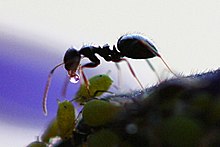Ants
Ants are eusocial insects of the family Formicidae and, along with the related wasps and bees, belong to the order Hymenoptera. Ants evolved from wasp-like ancestors in the mid-Cretaceous period between 110 and 130 million years ago and diversified after the rise of flowering plants. More than 12,500 of an estimated total of 22,000 species have been classified. They are easily identified by their elbowed antennae and the distinctive node-like structure that forms their slender waists.

Ants form colonies that range in size from a few dozen predatory individuals living in small natural cavities to highly organised colonies that may occupy large territories and consist of millions of individuals. Larger colonies consist mostly of sterile, wingless females forming castes of "workers", "soldiers", or other specialised groups. Nearly all ant colonies also have some fertile males called "drones" and one or more fertile females called "queens". The colonies are described as superorganisms because the ants appear to operate as a unified entity, collectively working together to support the colony.
Quotes
edit- I learn more from the anatomy of an ant or a blade of grass...than from all the books which have been written since the beginning of time. This is so, since I have begun...to read the book of God...the model according to which I correct the human books which have been copied badly and arbitrarily and without attention to the things that are written in the original book of the Universe.
- Tommaso Campanella Letter (1607), reported in Elizabeth L. Eisenstein, The Printing Revolution in Early Modern Europe (Cambridge UP, 2012), p. 218
- If ants are such busy workers, how come they find time to go to all the picnics?
- Marie Dressler, reported in Lore and Maurice Cowan, The Wit of Women (1969), p. 149
- None preaches better than the ant, and she says nothing.
- That swarm of ants that I observed, each one following the one ahead, have every one been Indra in the world of the gods by virtue of their own past action. And now, by virtue of their deeds done in the past, they have gradually fallen to the state of ants.
- "Indra and the Ants", reported in Cornelia Dimmitt, Classical Hindu Mythology: A Reader in the Sanskrit Puranas (1978), p. 321
- The ant’s a centaur in his dragon world.
- Ezra Pound, "Canto LXXXI", The Pisan Cantos (1948)
- It is not enough to be industrious; so are the ants. What are you industrious about?
- Henry David Thoreau, letter to Harrison Blake (16 November 1857)
- It was not until the ant and Veig had passed each other that Niall realized that he had been reading the ant's mind. It was a sensation like actually being the ant, as if he had momentarily taken possession of its body. And while he had been inside the ant's body, he had also become aware of all the other ants in the nest. It was a bewildering feeling, as if his mind had shattered into thousands of fragments, yet each fragment remained a coherent part of the whole.
- Colin Wilson, Spider World: The Desert (1987), p. 57
Hoyt's New Cyclopedia Of Practical Quotations
edit- Quotes reported in Hoyt's New Cyclopedia Of Practical Quotations (1922), p. 30.
- Ants never sleep.
- Ralph Waldo Emerson, Nature (1836), ch. 4
- Parvula (nam exemplo est) magni formica laboris
Ore trahit, quodcunque potest, atque addit acervo
Quem struit; haud ignara ac non incauta futuri.- For example, the tiny ant, a creature of great industry, drags with its mouth whatever it can, and adds it to the heap which she is piling up, not unaware nor careless of the future.
- Horace, Satires, Book I, I, 33.
- While an ant was wandering under the shade of the tree of Phæton, a drop of amber enveloped the tiny insect; thus she, who in life was disregarded, became precious by death.
- Martial, Epigrams (c. 80-104 AD), Book VI, Epistle 15.
- Go to the ant, thou sluggard; consider her ways, and be wise.
- Proverbs 6:6.